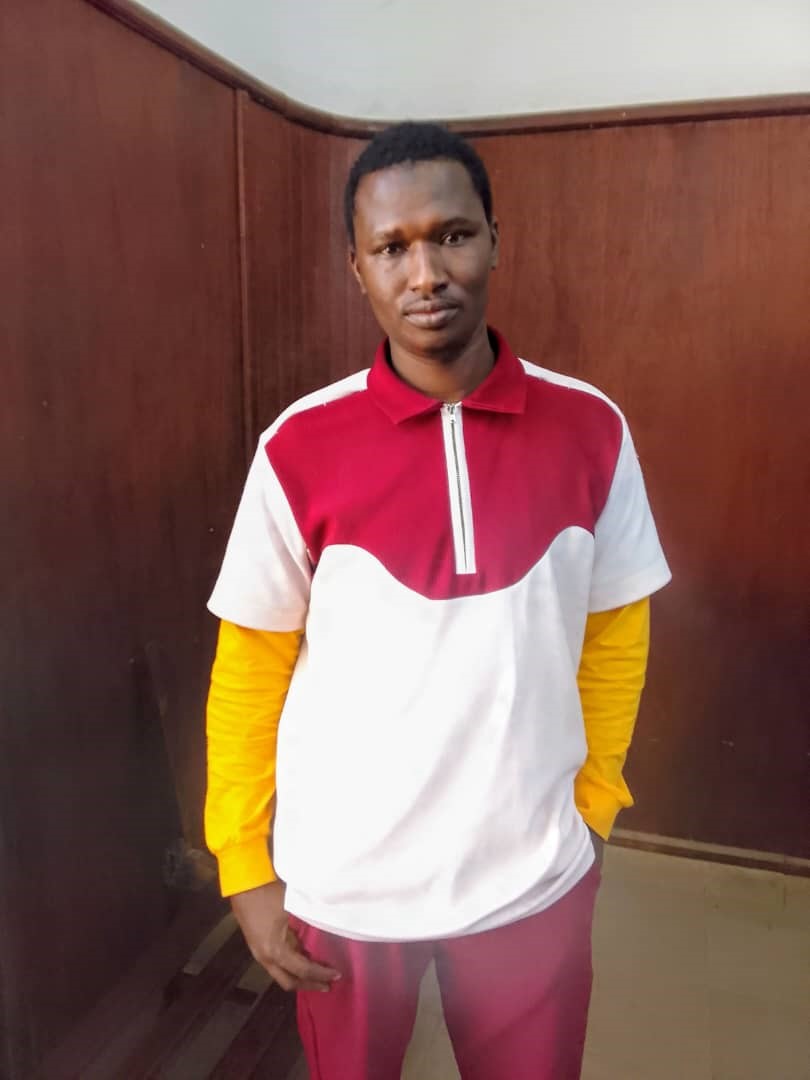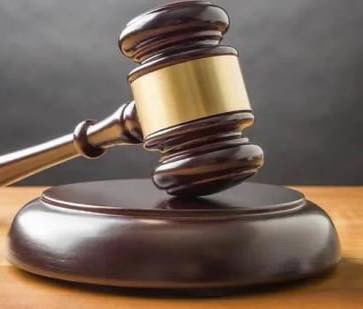By Isatou Sarr
A callous fraudster, Alagie Dikko who have been using different voices and names of Imam Chebou Cham, Imam Fatty and President Adama Barrow to collect money from his victim, Ousainou Mahanera was yesterday, 9th April 2025 sentenced and ordered to compensate his victim, Ousainou Mahanera with the sum of $180,000.00 (One Hundred and Eighty Thousand US Dollars) and also a pay a fine of D100,000.00 (One Hundred Thousand Dalasi) by Principal Magistrate Krubally of the Banjul Magistrates’ Court.
Going back to his statement of his offence, Alagie Dikko was ‘obtaining money by false pretence contrary to section 288 of the criminal code. His particulars of offence revealed that the accused, Alagie Dikko between the year 2021 and 2024 in Banjul and diverse place by false pretence and with intent to defraud obtained from one Ousainou Mahanera the sum of $170,000.00 with the pretext that he is going to use the said money to help Arabic School Orphans, gardens and drill boreholes for the communities which representation he knew to be false or not true at the time thereby committed an offence.’
This charge was later amended with the following that ‘Under section 169 we apply that the date on the charge sheet instead of 2021 to 2024 now be red from 2018 to 2025 in the particulars. Also the amount contained as 170,000 USD be read as $170,000 plus.
Notwithstanding Reading the statement of offence and the particulars to the accused in the language he understood, he pleaded guilty to the charge. and with the amendment he responded that that “it could be true but I cannot ascertain the exact amount.”
In summary of the narration of the fact of the matter, Prosecution ASP E.Sarr explained in detail that in 2018, the Accused was attending Imam Ali Trawally’s Arabic School. There he introduced himself to the complainant, Ousainou Mahanera, who was also from the same village, GambiSarrah Lamoi. The Accused introduced himself, and the two realized they were neighbors. The Accused then requested financial help from the complainant to settle his school fees, and the complainant agreed to help.
In 2019, the Accused began impersonating the voice of Imam Abdoulie Fatty, requesting assistance from the complainant. The Accused claimed that Imam Fatty had over 200 students in need of food, presenting himself as a good Muslim who could help the needy. The complainant, trusting the Accused, began sending money to help the students.
The Accused continued to contact the complainant, impersonating various figures like Imam Trawally and Imam Chebou Cham, and a Sarahuli man with the name Gabu that he is working with them, claiming to need financial assistance for projects. At one point, the Accused claimed there was a plot of land in Jarra Soma, with an Arab man from Saudi Arabia supposed to sponsor the project. The Accused sent pictures and documents, asking the complainant for money, promising repayment.
The complainant, believing the Accused’s stories, sent significant sums of money for land purchases, borehole drilling, and other alleged expenses related to the students and the project. Over time, the accused also fabricated stories about land issues, Imam Fatty’s illness, and the death of students, further persuading the complainant to send more money.
At one point, the Accused Impersonated Imam Chebou Cham, claiming that the students needed to be moved to Ghana for safety, and asked the complainant to send money for transporting the children. The complainant sent $6,000 initially, and later another $3,000 for the relocation.
In Ghana, the Accused, still impersonating religious leaders, claimed that the accommodations for the students were inadequate and asked for more money to purchase and develop another land. The complainant continued to send thousands of US dollars, believing that his financial contributions were being used for the students’ well-being.
Eventually, the complainant inquired if the money he had sent was recorded and would be reimbursed. The Accused then told the complainant that a person named Muhammed had sent $300,000 to settle the debts, but the money was frozen by the bank in Ghana. The complainant continued to believe in the Accused’s claims, leading to a prolonged deception.
The complainant, Ousainou Mahanera, received a call from the accused, who pretended to be Imam Fatty. The Accused claimed he was sick and needed surgery in Ivory Coast, prompting the complainant to send money for his treatment. Later, the Accused, still impersonating Imam Fatty, informed the complainant that a Saudi man who had come to the Gambia with $200,000 had passed away. The Accused claimed the money was now with President Barrow, but would be released once the Saudi man’s family arrived.
The complainant was then contacted by someone claiming to be President Barrow, who confirmed the Accused’s story, further assuring the complainant that the funds would be released soon. This gave the complainant confidence to continue sending money.
During this time, the complainant’s business partner, Hamedou Dukureh, arrived from the U.S. and began questioning the complainant about the financial situation. The complainant continued to rely on the accused, impersonating Imam Fatty and Imam Chebou Cham, who claimed there were issues in Ghana similar to those in the Gambia. The accused requested additional funds for transport, including for four men and one woman called Fatoumatta Jallow to accompanied the two people from Guinea Bissau and Guinea Conakry to perform rituals to remove “black magic.”
When the date to settle the payments arrived, the Accused requested more time. Dukureh grew increasingly impatient, suspecting something was wrong. He asked the complainant for the contact details of the real Imams, but the complainant refused to provide them. Dukureh then discovered that the total amount the complainant had sent was much higher than expected, reaching $353,000, which raised further concerns.
Later, while in Atlanta, the complainant received calls from a person named Hamedou, who claimed to be with Imam Chebou Cham. The complainant, realizing the voice was similar to the one he had been hearing from the Accused, started questioning Imam Chebou, who denied being in Ghana or Ivory Coast. During a video call, the Accused, still impersonating Imam Chebou, called and claimed the food had run out. The complainant then contacted Hamedou, who warned him not to send any more money through Western Union, as the name being used by the Accused was blocked.
The Accused, impersonating Imam Chebou Cham, informed the complainant that someone was coming to the Gambia and would be delivering money on his behalf. The complainant, Ousainou Mahanera, gave the accused’s contact information to his business partner, Hamedu Dukureh, who set a trap for the accused to be arrested. When Hamedu contacted the accused to pick up the money, he realized that the accused was using deceitful tactics. Hamedu informed the complainant that his (accused’s) nephew had been arrested and had confessed that the accused was behind the money collection scheme. The accused’s wife was also arrested, and the accused, who was in Ghana at the time, called Hamedu pleading for help.
The case was escalated to Interpol, leading to the accused’s return to the Gambia with the help of the complainant. Upon arrival, the Accused was arrested by the naval force, confronted, and confessed to his involvement in the fraudulent activities. The prosecution presented 766 receipts of transactions indicating money sent by the complainant, both in Gambia and Ghana, which were accepted as evidence by the court.
Further investigation revealed that the Accused, whose true name is Alagie Dikko, had multiple passports under different names, including “Alagie Camara” and “Alagie Dikko,” both of which he used to receive funds. The prosecution applied to submit copies of these passports as evidence, which the court also accepted.
Despite extensive money transfers, no funds have been recovered, and none of the projects promised by the Accused were ever executed. The Imams the Accused claimed to impersonate did not exist at the time, and the voice calls and audio messages were simply the Accused’s impersonations.
Prior the judgement, the court presided over by Principal Magistrate Krubally asked the Accused if he understood the brief facts narrated by the prosecution. The Accused confirmed that he did, although he disputed the claim that $6,000 and $3,000 were sent to him and clarified that he had mentioned Imam Chebou being sick, not Imam Fatty.
The court acknowledged that the Accused had voluntarily confessed to the charges and agreed with the prosecution’s facts. Based on this confession, the court indicated that it would proceed to judgment.
In his judgement, Principal Magistrate Krubally said “I have considered the nature of the offence with which the accused, Alagie Dikko, is charged. I have also taken into account his guilty plea at the first reasonable opportunity, thereby saving the court’s time. The prosecution has informed the court that he is a first-time offender with no prior criminal record or convictions.
However, the mitigating circumstances presented are not compelling. The accused misrepresented facts and deceived the complainant by claiming that he would use funds to drill boreholes for communities, build schools, and pay school fees for children. He later contradicted himself, stating that he used the money to travel to the USA and intended to repay the complainant upon success, but failed to do so. This conduct amounts to obtaining money by false pretenses, which is a serious offence and has caused substantial financial losses to the victim, Ousainou Mahanaira, and his business partners, Muhamadou Dukureh and Hamedu.
I have also declined the accused’s request to pay the sum of 170,000 USD (equivalent to millions of Gambian dalasis) in monthly instalments of 50,000 dalasis.
In light of all the above, I exercise my discretion under Section 29(3) of the Criminal Code, considering the view that first-time offenders should be given the option of fines rather than custodial sentences, as outlined by Chomber P JCA.
Therefore, in accordance with Section 29(3) of the Criminal Code, I order that Alagie Dikko pays a fine of 100,000 dalasis (one hundred thousand dalasis). In default of payment, he will serve one year in prison.
Regarding the prosecution’s application for compensation to the crime victim, Ousainou Mahanaira, who has suffered economic losses, I order that Alagie Dikko compensates him with 180,000 USD. In default of payment, he will serve two years in prison.
The sentence terms shall run consecutively.”





